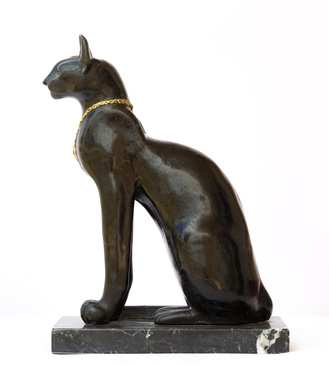As an agrarian society, the ancient Egyptians had a problem with mice, rats and snakes all of whom threatened the grain stores. It is thought that the ancient Egyptians learned that wild cats preyed on these scavengers. They began to leave out food to tempt the cats to visit them. This suited the cats perfectly as being close to human settlements not only provided them with a ready supply of food (the vermin and the food left by humans) but also helped them to avoid larger predators. As this symbiotic relationship developed cats were welcomed indoors and eventually consented to move in with their human friends and rear their kittens in the safety of a home. Praised for controlling vermin and its ability to kill snakes, the domesticated cat became a symbol of grace. The goddess Mafdet, the deification of justice and execution, was a lion-headed goddess. The cat goddess Bast (also known as Bastet) eventually replaced the cult of Mafdet, and Bast's image softened over time and she became the deity representing protection, fertility, and motherhood. As a revered animal and one important to Egyptian society and religion, some cats received the same mummification after death as humans. Mummified cats were given in offering to Bast. Small cats would often be found underneath women's chairs on reliefs, evoking fertility and sexuality.
When a cat died, the household would go into mourning as if for a human relative, and would often shave their eyebrows to signify their loss. Such was the strength of feeling towards cats that killing one, even accidentally, incurred the death penalty.
We know your cat is part of your family. Kitty in NY offers the best cat care solutions for your holidays and trips. We will help you find a temporary home for your cat while you're away. We also propose cat sitting services (visits to your apartment by a professional cat lover). We have caregivers available in Manhattan, Brooklyn and Queens.


 RSS Feed
RSS Feed

